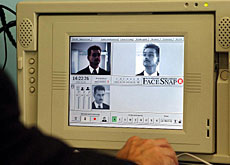Left fears threat to freedom from Schengen

The European Union Schengen and Dublin agreements depend on two computerised information management systems.
Some Swiss are concerned about a possible threat to freedom if Switzerland signs up to the accords. Members of the political Left, in particular, still have painful memories of the “records scandal” which rocked Switzerland in the autumn of 1989.
When the Berlin Wall was being dismantled, Switzerland too was having to face up to skeletons in the cupboard from the Cold War era.
An investigation by the justice and police ministry found that the country’s political police had been keeping records on 900,000 people and organisations regarded as a threat to Swiss internal security. The discovery provoked a wave of protest.
Since those days, the political climate has changed. Organised crime and terrorism have again made security a burning issue. Concerns for the protection of privacy are counterbalanced by a determination to deal effectively with criminals.
But in some leftwing circles the prospect of Switzerland’s signing up to international agreements on security is arousing old suspicions, combined with fears about computerised data management. The Schengen and Dublin agreements in fact depend on the operation of two large computerised databases.
SIS and Eurodac
The Schengen Information System (SIS) is a network of national databases managed by the member countries. It contains information on people (wanted or missing persons, illegal immigrants, persons subject to “discreet surveillance”) and property (cars, documents, stolen weapons, banknotes).
The data is fed into the SIS by the competent national authorities (in Switzerland this would mean the Federal Police Office). In the case of persons, the data includes name, age, nationality, sex, the reason for registration, and whether or not the individual is considered dangerous.
Police forces can access this information by logging on to the SIS. Further information can be requested from the competent authority in the country that registered the individual concerned.
At present, the SIS contains over 11 million items. Entries relating to individuals number one million, of which 800,000 are concerned with expulsion orders from the Schengen area or orders prohibiting entry. Fifteen thousand of those persons registered on the system are wanted for criminal offences.
In 2003, the Eurodac database also came into operation. This is a system for storing the fingerprints of all persons over 14 years of age who have lodged an asylum application in one of the countries signatory to the Dublin Agreement.
The database is designed to achieve one of the principal objectives of that agreement: to prevent people from making more than one asylum application.
Data protection
The convention implementing Schengen contains a series of clauses guaranteeing data protection (articles 102-118). In principle, personal data must be reviewed after it has been stored for three years.
Persons registered on the system have a right to consult their entries and have any wrong information corrected or removed.
The convention provides for the establishment of national and international monitoring authorities. And if erroneous data results in loss or damage to a listed individual, he or she is entitled to compensation.
For Hanspeter Thür, the federal data protection commissioner, the Schengen rules provide sufficient data protection guarantees.
“This represents a consolidation of our own legislation,” he told the Geneva-based Le Temps newspaper. “The agreement lays down strict rules governing the exchange of information.”
Thür’s generally positive assessment has been enough to dispel the doubts of many on the Left, whose main concern is to establish closer tries with the EU.
“Schengen is not an agreement about spying on the people of Europe, but about fighting organised crime,” points out Hans-Jürg Fehr, president of the Social Democrats.
Dissent on the Left
However, some elements on the Left do not accept this. And though they have decided not to force a referendum in parallel to the one being organised by the anti-EU right, they have no hesitation in protesting against the dangers they consider the Schengen and Dublin agreements present.
“Thür is putting his faith in the legal guarantees contained in the Schengen Agreement,” observes Heiner Busch, of the organisation Solidarités sans Frontières.
“But in practice it is very difficult to obtain access to one’s personal data. Especially as the rules vary from one country to another.”
For someone prohibited from entering the Schengen area, points out Busch, getting their data amended is virtually impossible without the help of a lawyer in the country where the decision was taken.
“And people in the category subject to ‘discreet surveillance’ – a problematic concept in itself – have absolutely no way of accessing their data.”
As for Eurodac, the problem as Busch sees it is not so much one of data protection, but of the very idea behind the system.
“Eurodac does not contain names. But one is bound to ask whether it is legitimate to register all asylum seekers over 14 years of age in a centralised database just to prevent them from applying for asylum twice over.”
swissinfo, Andrea Tognina
The Schengen Information System (SIS) contains personal information on one million individuals.
800,000 entries relate to persons denied the right to enter or stay in the Schengen zone.
15,000 relate to persons wanted for criminal offences.
The Eurodac database records the fingerprints of all asylum seekers over 14 years of age.
Originally designed for eight countries and now used by 15, SIS has reached the limits of its capacity.
In 2001, work began on a new version of the system ahead of EU enlargement.
SIS II should begin operating in 2007. There are plans to extend it to new categories of person (in particular violent individuals), and to add biometric data.

In compliance with the JTI standards
More: SWI swissinfo.ch certified by the Journalism Trust Initiative



You can find an overview of ongoing debates with our journalists here. Please join us!
If you want to start a conversation about a topic raised in this article or want to report factual errors, email us at english@swissinfo.ch.